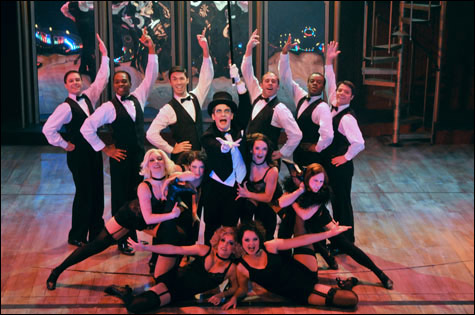
CABARET: John Kuntz and the Kit Kat ensemble need more depravity and desperation. |
The New Century, a quartet of related short plays by Paul Rudnick, takes its name from the discount department store Century 21, the Lower Manhattan incarnation of which the playwright perceived still shining in the smoke and grit generated by the 2001 fall of its neighbor the World Trade Center. There is something cut-rate, too, about Rudnick's attempt to marry flamboyant gay cliché to hope for a post-9/11 world in this new theater piece, which debuted at Lincoln Center last spring and is now in its area premiere from SpeakEasy Stage Company (at the Calderwood Pavilion through February 14). That does not change the fact that, as a purveyor of one-liners, Rudnick is more Neiman Marcus than Century 21. And before it starts straining toward a saccharine profundity in its final, title vignette, The New Century fields what amounts to a trio of comic monologues featuring likable eccentrics — all of whom have been grazed by if not immersed in gay culture — that will leave you feeling like the happy victim of an assault by Jackie Mason, Dame Edna, and Oscar Wilde.
And that triumvirate has nothing on Rudnick's three bearers-up: Helene Nadler, self-proclaimed most tolerant mother of all time; flaming Mr. Charles, cast from Manhattan into the wilderness of Palm Beach for being "too gay"; and Decatur housewife Barbara Ellen Diggs, a dedicated craftsperson drowning her maternal sorrows in bric-a-brac and cake decoration. In what is not quite a play, these survivors address us from various public forums: for Helene a meeting of the Massapequa chapter of Parents of Lesbians, Gays, Bisexuals, the Transgendered, the Questioning, the Curious, the Creatively Concerned, and Others; for Mr. Charles the middle-of-the-night cable-access TV show whose spotlight he shares with a beefcake companion named Shane; and for Barbara Ellen, who's surrounded by her cockamamie creations, the Junior Chamber of Commerce she is turning on to "the critical importance of crafts in our culture." How these three wind up warming the cockles of one another's hearts in the maternity ward of a Manhattan hospital in the final vignette would strain both lumbago and credibility to chart.
Paula Plum brings her acerb warmth and ace timing to liberal Long Island Jewish matron Helene, resplendent in winter-white pants suit and highlighted hair extensions. If all of American life is a competition, Helene is confident of winning hers: a race for the gold in maternal acceptance and support. The mother of a lesbian, a transsexual, and a leather fetishist pushing the erotic borders of excrement, she wavers between complaint and braggadocio, and most of what comes out of her perfectly painted mouth is hilarious. (Of TV's Will and Grace she opines, "It was like if Pottery Barn sold people.")